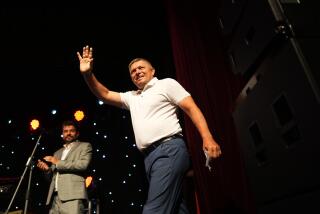The Feckless Serb Opposition Needs to Get Its Act Together
- Share via
WARSAW — We have in Poland some scuffles between former communists and former anti-communists from Solidarity. But not to worry. More than 10 years after we shed totalitarianism, Poland is a rather normal country, wiping its shoes before entering the door of the European Union. This swift move from dictatorship to democracy is attributed to many factors but the one sine qua non that Poland met was that Solidarity lived up to its name and there was unity among the opponents of the dictatorship.
Back in 1996, Serbian opposition leaders, too, had a catchy name for their coalition: “Zajedno,” meaning “together.” But live up to it, they did not. So now, divided as before, they survive in a country that is the pariah of Europe and under an oppressive regime that shows no willingness to reform. Not only does Serbia not get anywhere close to the EU doormat, the only door that would welcome the Yugoslav president, Slobodan Milosevic, is that of a cell at the war crimes tribunal in the Hague.
Meanwhile, some 800 Serbian officials and their families are on the EU’s list of persona non grata, i.e., people who will not get a visa into any of the EU countries. Thus, when the Balkans Stability Pact (composed of the U.S. and EU nations) funding conference opened on Tuesday in Brussels, the recipients who could attend from Serbia were not Serbian officials but representatives of the opposition: independent journalists, activists from the nongovernment organizations, some elected local authorities and opposition politicians. It is the latter group that under normal circumstances would be expected to make political change happen.
Which brings us back to “solidarity” or rather the lack thereof. The internal bickering among the leaders of the opposition parties in Serbia is such that they spend more time and energy fighting each other than fighting Milosevic. This bizarre power struggle of the powerless seems to be the specialty of the house in the Balkans: The two factions of Kosovo Albanians traveling to the Rambouillet conference more than a year ago to confront the regime from Belgrade would not board the same plane (they still are not on speaking terms).
Paralyzed and unable to stage any genuinely common action, the Serbian opposition activists are branded by the regime as “proponents of anti-Serb ideas in Serbian streets and cities, [who] are trying to achieve what the American criminals and their servants failed to achieve while devastating our country for three months.”
One can almost say that the Belgrade regime gives the Serbian opposition more credit than it deserves. True, a common document signed on Jan. 10 by 17 parties and coalitions called on the Serbian regime to stage elections and on the international community to lift sanctions. However, the one mass action announced in that document--a demonstration for the ninth anniversary of the first anti-Milosevic demonstration--was a nonevent. That day, March 9, came and went without anyone organizing anything. Then on March 22, the opposition parties decided that a demonstration under the slogan, “Stop the Terror--For Democratic Elections,” will be held April 14 in Belgrade. One wonders why the Serbian opposition leaders want to wait so long. At the pace Milosevic is operating against the independent media, there will be hardly a free voice left to inform about that demonstration.
The donor countries and institutions that want to help the Serbian people should realize that if the Serbian opposition leaders are divided, it is perhaps not because they have not received enough aid but because they fight among themselves to determine the pecking order at the trough. Pumping in more dollars and euros may not be a solution.
The organizers of the Balkans Stability Pact conference could make their message clear: Either the Serbian opposition parties get together, present a common electoral strategy and common ballots for local polling and form an umbrella organization that could be a partner for discussions on assistance, or else all aid designated for Serbia will go not to the party machines but to other dissenters: journalists, nongovernment organization activists and opposition mayors. To continue giving unconditional support to political parties that declare themselves opposed to Milosevic but use this support to argue against each other and drag their feet on concrete actions is to help perpetuate the status quo. This is not in the interest of the international community or of the Serbian people.
More to Read
Sign up for Essential California
The most important California stories and recommendations in your inbox every morning.
You may occasionally receive promotional content from the Los Angeles Times.













